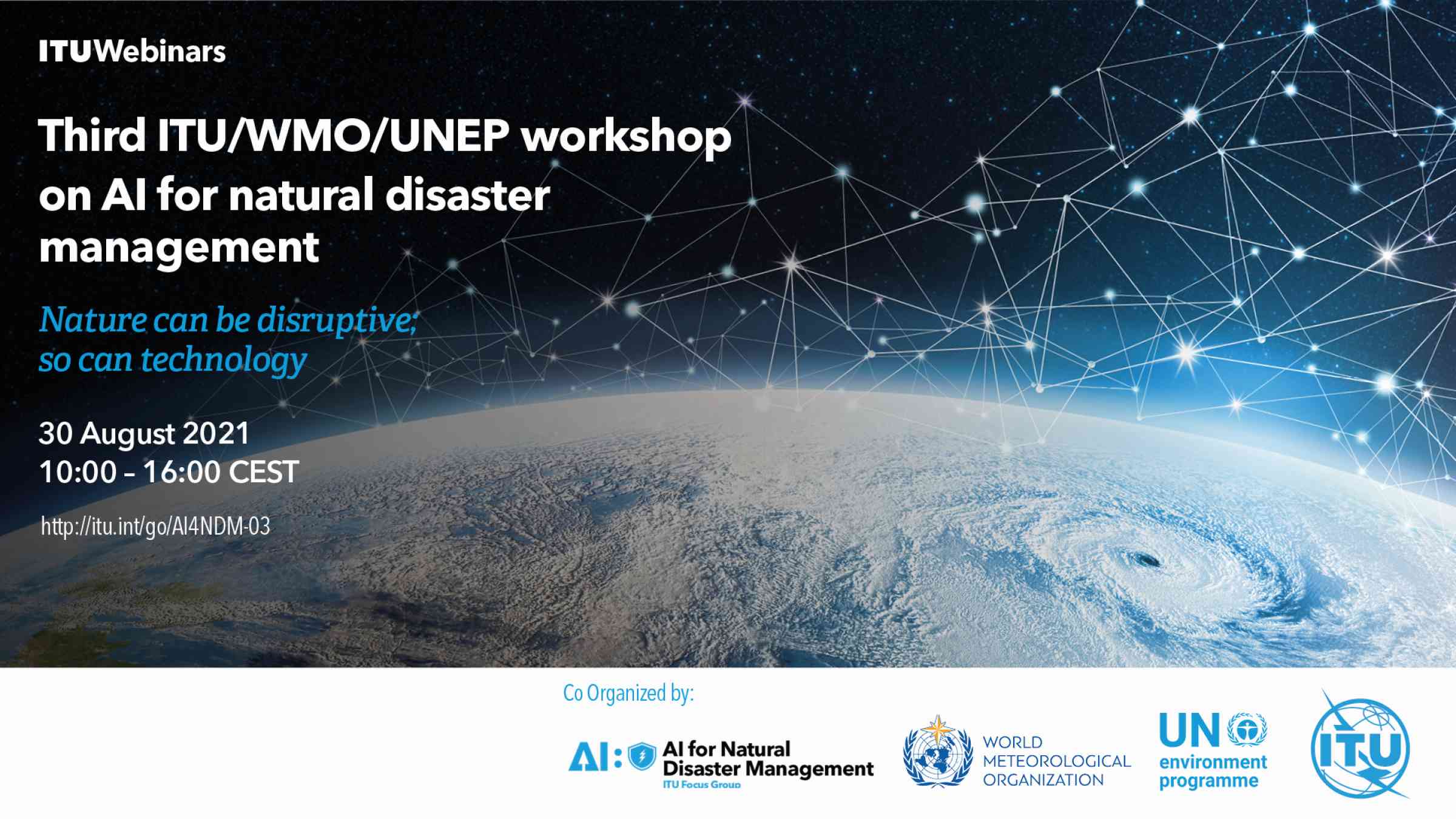Third ITU/WMO/UNEP Workshop on Artificial Intelligence for Natural Disaster Management

- English
Introduction
The International Telecommunication Union (ITU), World Meteorological Organization (WMO) and UN Environment Programme (UNEP) are co-organizing a third workshop to highlight uses of artificial intelligence (AI) for supporting the detection, forecasting, and communication of natural hazards and disasters.
The workshop will take place at 10:00 -16:00 CEST on 30 August 2021, and will be followed by the third meeting of the ITU/WMO/UNEP Focus Group on AI for Natural Disaster Management (FG-AI4NDM) on 31 August - 2 September 2021 at 13:30 - 16:00 CEST.
Objectives
The workshop will explore ways that AI can enhance modelling across spatiotemporal scales and facilitate effective communication in the event of a natural disaster. The workshop will consist of four sessions. First, a session of high-level keynote presentations will set the stage. Then, three sessions of high-calibre technical presentations and discussions will enable us to delve deeper into this topic.
Target Audience
The focus group workshops and meetings are freely open to ITU Member States, Sector Members, Associates, and Academic Institutions and to any individual from an ITU member country. This includes individuals who are members of international, regional, and national organizations.
Participation
Registration is mandatory to attend the workshop. Please note that registration for the FG-AI4NDM meeting 31 August - 2 September 2021 is separate
Draft Programme
| 10:00 - 10:15 | Opening Remarks
|
| 10:15 - 11:00 | Session 1: Introduction to ITU/WMO/UNEP FG-AI4NDM and Keynotes
|
| 11:00 - 12:20 | Session 2: AI for Communications The session will address how AI can support effective communication for natural hazard-related emergencies. It will explore how AI is being used for susceptibility mapping of natural hazards, how AI is being used for natural catastrophe modeling for insurance purposes, and how AI-based chatbots can be used during natural disasters. Session Chair: Paula Padrino Vilela, Project Coordinator, United Nations Environment Programme (UNEP)
|
| 12:20 - 12:40 | Break |
| 12:40 - 14:00 | Session 3 - AI for modeling (reforecasting and projecting) The session will delve into the use of AI for forecasting and projecting natural disasters. For instance, it will look at how hail, floods, and fog can be forecasted using AI. Session Chair: Erica Allis, Senior Programme Manager at World Meteorological Organization
|
| 14:00 - 15:30 | Session 4: AI for data (monitoring and detecting) The session will focus on how AI can be used to monitor data streams and detect events in real time. It will look at how AI can be used to detect earthquakes and insect infestations. It will also look at how AI can be used to automate the annotation of remotely sensed imagery. Session Chair: Arif Albayrak, Associate Research Engineer, NASA Goddard Space Flight Center, Maryland, USA, Co-Chair, ITU/WMO Data Working Group
|
| 15:30 - 15:45 | Mike Farrar, Director, National Centers for Environmental Prediction (NCEP) at National Weather Service: "The growing importance of AI in weather, water and climate applications: dual perspectives from the American Meteorological Society (AMS) and the U.S. National Weather Service" |
| 15:45 - 16:00 | Closing Remarks |